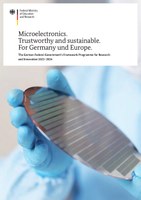

 The issue at stake is the competitiveness of Germany and Europe in the world. But it is also
The issue at stake is the competitiveness of Germany and Europe in the world. But it is also
a matter of trust. In future, anyone using a self-driving vehicle must be able to rely on it getting them safely to their destination. And it is not only here that trust is an issue.
Today’s innovations are increasingly digital and based on electronic systems. For electronics to be trustworthy, we need to understand it. We can only do this if we have cutting-edge expertise in industry and the scientific community and develop this continuously. The more we design, develop, manufacture advanced electronics ourselves and ensure their safety and security, the better we will understand what third-party electronics can and cannot do. This enables us to work on an equal footing worldwide and to enforce requirements for electronic systems we use or operate.
Sustainability plays a part in this. We need digitalisation and hence electronics that work in line with our climate goals instead of further increasing the consumption of resources.
We are striving for Europe’s technological sovereignty and, at the same time, we are eager to engage in cooperation. Given the highly networked knowledge and value chains in electronics, cooperation is necessary and advantageous. In this context, we give priority to collaborations in the European Single Market and the European Research Area based on shared values. We thus support the development of European electronics expertise in research and production so that Europe can continue to be strong as a community in the international competition.
We are committed to turning ideas into innovations that are successful worldwide and benefit people. Whether as researchers, users or consumers: with this programme for research and innovation in electronics, we are strengthening our technological sovereignty and, in turn, the prosperity of our country.
Erscheinungsjahr: 2020